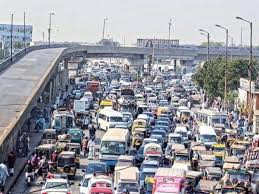
By our correspondent
KARACHI: On Friday, residents of Karachi’s Baloch Colony took to the streets in protest over ongoing power outages and water shortages, causing significant disruptions to traffic. The protest, which took place on the Shaheed-e-Millat flyover, left commuters stranded for hours as the demonstrators blocked the vital route to voice their frustrations over the continued lack of basic services. The residents demanded immediate action from the authorities, insisting that the protest would only end once the power and water supply issues were resolved.
The blockade led to severe traffic congestion not only on the flyover but also in surrounding areas, as commuters were stuck in gridlocks for an extended period. As the protest continued, tensions mounted, with both local residents and travelers expressing their discontent. After two hours of negotiations, local authorities intervened, assuring the protesters that steps would be taken to restore both water and electricity services. This promise led to the suspension of the protest, although the traffic situation remained chaotic for several more hours, as the gridlocks persisted even after the protest was called off.
The situation only began to improve after police forces intervened, managing to disperse the protesters and clear the roads, allowing traffic to resume. Despite the resolution of the protest, the lasting effects on traffic were felt for a while, as commuters continued to experience delays.
In a statement issued in response to the protest, K-Electric, Karachi’s primary electricity provider, clarified that the power outage in Baloch Colony was unrelated to the demonstration. The company confirmed that electricity supply to the area was functioning normally, suggesting that the protests may have been triggered by other issues or misunderstandings regarding power supply.
This protest highlights ongoing concerns among Karachi residents about the reliability of basic public services, with water and power shortages frequently being a source of public dissatisfaction. The disruption caused by the protest also underscores the growing frustration among citizens who feel that their grievances are not being adequately addressed by the authorities. The successful negotiations that ended the protest show a potential willingness from local authorities to resolve the issue, but it remains to be seen whether such assurances will lead to long-term improvements in the availability and reliability of essential services in the area.



